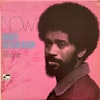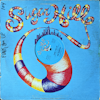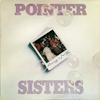Political statements have been communicated through jazz since the music’s inception. Such statements blossomed in the works of musicians like Max Roach and Charles Mingus but were even more notable in performances by vocalists Billie Holiday, Nina Simone and Abbey Lincoln. By the late 1960s, the Civil Rights Movement and the Vietnam War made protest in art not only popular but crucial.
Eugene McDaniels moved to Los Angeles in the late 1950s to begin a career as a jazz singer. Sitting in regularly with groups around the city, McDaniels became familiar with the local talent, but it was his relationship with pianist Les McCann that truly boosted his career. The pair were working packed regular gigs at the Lamp on Cahuenga Boulevard when Liberty Records discovered McDaniels and signed him in 1960. The next five years saw the young vocalist (marketed as Gene McDaniels) release four successful, orchestrally laced pop records for the label.
But the song that cemented McDaniels’s legacy in protest was his 1966 penned “Compared to What?” The brazen tune condemned then-President Lyndon Johnson, the Vietnam War and inequalities in the United States. Originally recorded by McCann that year and by Robert Flack in 1969, “Compared to What?” really caught fire when McCann and saxophonist Eddie Harris released an extended, exclamatory version from their Montreux Festival performance in June, 1969 on the album Swiss Movement.
Los Angeles–born vibes prodigy Bobby Hutcherson met McDaniels through Gerald Wilson’s Big Band as a teenager. Through the ‘60s, the vibist established himself in the jazz avant-garde playing alongside trailblazers like Jackie McLean, Archie Shepp, and Andrew Hill. Hutcherson’s Blue Note debut, Dialogue (1965), was greeted enthusiastically and awakened the jazz world to his promise as a band leader. It was on that debut that Hutcherson presented two pieces, “Idle White” and “Dialogue,” written by recent D.C. transplant, percussionist Joe Chambers.
Fast forward to 1969: Nixon is President, the Vietnam War continues to rage, and racial unrest expands a year after the assassination of Dr. Martin Luther King, Jr. McDaniels’s denunciatory “Compared to What?” had sprung into the popular lexicon, and Hutcherson discovered that his friend Chambers had written a new tune with this recently righteous vocalist, “Hello to the Wind.” Inspired by this and his own exploration of the poetry of Paul Laurence Dunbar, Hutcherson began to build an album concept around McDaniels and his quintet. It would eventually expand further with the addition of a female vocal group, guitar, and percussion.
Recorded at New York’s A & R Studios over two sessions in the fall of 1969 with producer Duke Pearson, Now! stood apart from other recordings of the oeuvre. There was a sweeping beauty in the mixture of vibes and voices but also a melancholy funk that permeated the entire album. Hutcherson and McDaniel’s “Slow Change” is a perfect example. As a hypnotic, off-kilter pulse of a waltzing, three-on-two beat shifts into a blazing up-tempo vamp for Harold Land’s blustery tenor, McDaniels’s terse message is of “God is watching, God is dying, slow change….” His message seemingly pulled in anguish from a music world built of both simple pleasures and despair.
Wally Richardson’s haunting guitar introduces the album’s highlight, Chambers and McDaniel’s “Hello to the Wind,” a piece that begins sedately but builds in waves of swirling, rhythmic intensity, McDaniels’s powerful incantations pushing the emotional energy past what the lyrics alone could provide. Kenny Barron’s melancholy piano, Hutcherson’s vibes, and the studio-honed voices of Christine Spencer, Hilda Harris, and Albertine M. Robinson are keys to Hutcherson’s introspective tone poem “Now,” written for his friend, bassist Albert Stinson, who had died the previous June from an overdose.
The album’s B-side begins with the bassist Herbie Lewis’s “The Creators,” with Candido’s conga, Richardson’s psychedelic guitar, and vocal incantations creating a seductive bed for solos by Land, Hutcherson, and Stanley Cowell’s winding Rhodes. The recording closes with Land’s “Black Heroes,” which contains the most assertive voice of Black liberation on the album. McDaniels's exasperated pleas with singers Spencer, Eileen Gilbert, and Maeretha Stewart of “freedom now!” are stated emphatically over a simple but effective modal structure.
Now! may have been Bobby Hutcherson’s most direct expression of the political and spiritual nature of his music, but it spelled just the beginning for McDaniels. The singer-songwriter, reverting nominally to Eugene McDaniels, reinvented himself into a mystic revolutionary on two searing albums for Atlantic Records. His brilliant Outlaw was recorded in February 1970 and released later that year. It was followed by the stone classic, Headless Heroes of the Apocalypse, which would spin everybody’s heads in 1971 with its unique blend of gospel, jazz, and psychedelic influences.


